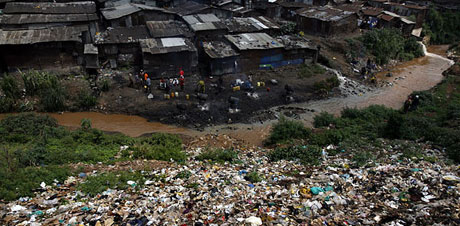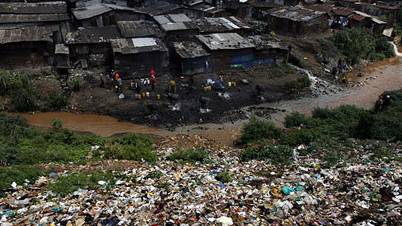Kenyan Police Combat Occult Secret Society
Source: nytimes.com

In a giant Nairobi slum called Mathare, the Kenyan police are battling a mysterious society called the Mungiki. More than 50 people have died.
These days Charity Bokindo, the district commissioner of Nairobi North, is taking no chances.
Wherever she goes, she carries not one but two pistols, and she always travels with armed guards.
“The Mungiki,” she whispered, “they threatened to circumcise me.”
Kihara Mwangi, a member of Kenya’s Parliament, recently disclosed that he had been kidnapped by the Mungiki, a secret society that is part Sicilian Mafia, part Chicago street gang, with a little of the occult sprinkled in. “These guys are devil worshipers,” he said. “And no one knows what they want.”
The Mungiki mystery is sweeping across Kenya, taking a lot of lives with it. In a month, more than 50 people have been killed in a crime spree and brutal police crackdown related to the shadowy outfit.
Police officials say the Mungiki aim to destabilize the country before the presidential elections in December and blame them for some downright ugly acts: chopping off legs, skinning heads and guzzling jerrycans of human blood. Government officials accuse them of running an extortion empire and hacking up victims as a scare tactic.
The Mungiki Menace, as local papers call it, plays into many of Kenya’s sore spots: tribal frictions, political shenanigans, poverty and crime. The flash point is Mathare, a giant slum and mountain of rust near downtown Nairobi, the capital, where 500,000 people fill a warren of corrugated metal shanties.
On a recent afternoon, John Kinywa, 17, a passion fruit juice vendor, trolled his patch of Mathare, shaking a plastic bowl for donations for a friend’s funeral. “Just a shilling; can’t you spare a shilling?” he asked passers-by, who, by the look of their ragged clothes and chopstick legs, probably could not.
Mr. Kinywa said police officers shot his friend, who he insisted was innocent, in a raid against the Mungiki in early June after two police officers were gunned down in Mathare. With grubby fingers, he counted out several others who had recently been zipped up into body bags.
There may be a lot of death in Mathare’s muddy alleyways, but there is also a lot of life: reggae rap thumping from blown-out speakers; women sitting on the ground and braiding hair; boys pushing impossibly overloaded carts; goats nibbling grass; little chicken-wire barbecues cooking up corn.
Mathare is one of countless slums in Kenya that the government does not quite reach. There are no police stations here, or fire hydrants or roads. There are few toilets and the hillsides reek of fresh waste. Many of the dented metal kiosks advertise — in dripping hand-painted scrawl — paraffin for oil lamps, because despite the palatial homes in the neighborhood next door that light up like soccer stadiums at night, most Mathare dwellers have no electricity.
“These people live like beasts,” said Ms. Bokindo, one of the government officials in charge of Mathare.
The Mungiki did not start here. They came from the Kikuyu highlands north of Nairobi, that carpeted green, straight-off-a-postcard “Out of Africa” side of Kenya.
According to Hezekiah Ndura Waruinge, one of the Mungiki’s founders, the group began as a local defense squad during land clashes in the late 1980s between forces loyal to the government, which was dominated by the Kalenjin tribe, and farmers who were Kikuyu, a rival tribe.
The Mungiki, whose name means multitude in the Kikuyu language, modeled themselves after the Mau Mau, Kenya’s independence fighters who sprouted dreadlocks, took secret oaths and waged a hit-and-run guerrilla war against British colonizers.
By the late 1990s, the Mungiki went urban, Mr. Waruinge explained, taking over the city’s minibus trade. Then they diversified into garbage collection, building materials and eventually the protection racket.
“It was beautiful,” Mr. Waruinge said. “We had 500,000 members and millions of shillings coming in every day.”
But then the Mungiki made a mistake, Mr. Waruinge said, and dabbled in politics, supporting losing candidates in the elections of 2002 and falling on the wrong side of the government.
Mungiki leaders were rounded up and charged with inciting violence. The Mungiki went underground, though they continued to levy protection taxes, electricity taxes and water taxes. They even gave receipts.
“They’re not such bad people,” said Dominick, who runs a lunch stall in Mathare and employs two Mungiki members to pour tea and bake chapati. Even though he had little bad to say about the Mungiki, Dominick declined to give his last name because, he said, “these guys drink blood. You never know what they might do to you.”
Dominick, along with several other Mathare residents, said their neighborhood had been infested by muggers and drug dealers until the Mungiki came along and established a rough sense of order.
But that order began to unravel last fall when the Mungiki tried to raise taxes on bootleggers who brew a toxic form of homemade alcohol, called changaa, on the banks of the smelly Mathare River. The bootleggers armed a rival gang called the Taliban (no Muslim connection — the gang members just thought the name sounded cool) and the fighting between the sides killed more than a dozen people and drove thousands away.
In May, the Mungiki were suspected of beheading four defectors. Then the two officers were ambushed. The police responded by storming Mathare with machine guns and tear gas. More than 30 people were killed and hundreds arrested.
Before the smoke cleared, accusations began to fly. Opposition members blamed the government for letting the Mungiki Menace spin out of control. Government ministers threatened to arrest opposition leaders, including a presidential candidate. Ms. Bokindo admitted the government was very worried. “They almost overwhelmed us,” she said.
The Mungiki seem dormant now on Mathare’s dirt boulevards. But several residents said that was not necessarily a good thing. Apparently, the muggings are back.
Article from: http://www.nytimes.com/2007/06/22/
world/africa/22mungiki.html?_r=1&ref=africa&oref=slogin






















